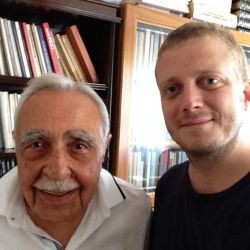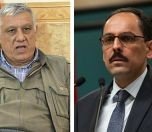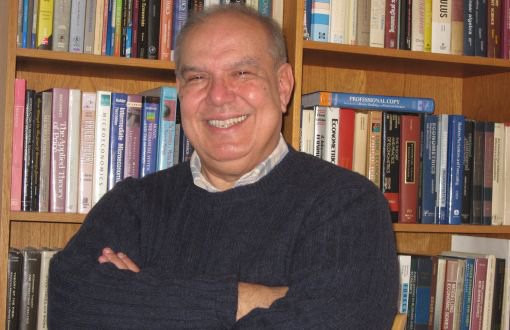We have spoken on what level Kurdish question has reached with Kurdish politician Tarık Ziya Ekinci, the former deputy of Workers’ Party of Turkey.
Ekinci stating that President Recep Tayyip Erdoğan is willing to marginalize the Peoples’ Democratic Party (HDP) in order to establish his own presidential system and is eager to sustain the clash atmosphere during the election period to achieve this goal, said the only way to hinder this project is the Kurdistan Workers’ Party (PKK) taking away the excuse of security forces for resorting to arms by declaring unilateral ceasefire.
Ekinci added that public opinion should pressure as soon as possible both the state and the PKK to put an end to the armed conflict.

Kurdish question and democracy
How come the two-year-long cease-fire period suddenly came to an end? Was the resolution process standing on such a fragile ground? What has led us to return to this severe conflict atmosphere?
There is a highly neglected subject in Turkey. No one seems to take the strong bond between the Kurdish question and democracy into consideration. It was Tarhan Erdem first who wrote regarding this subject on media. As long as democracy remains at this level, it is not possible to resolve the Kurdish question.
Erdogan has used the peace process for years as an instrument for election campaigns; as in 2011 elections as well as in the local and presidential elections held last year.
He had intended to use it for the same purpose in 2015 elections but the HDP ruined it for him.
Effect of “We will not let you become president” on Erdoğan
How did the HDP ruin it?
Nationalitarian circles have mounted a ruthless attack against the HDP. They have repeatedly said “The HDP came to terms with the Justice and Development Party (AKP). The aim is to release Ocalan and have Erdogan elected as president. They are cooperating within this framework.”
Selahattin Demirtas, the co-chair of the HDP, addressing to these concerns said three times “We will not let you become president.” This statement has become effective in this regard; it has affected sceptical voters and sorely shaken Erdoğan.
Thereupon Erdoğan proclaimed three days later, on March 20 that he disapproved of
Dolmabahçe agreement. After this stage, the sides have slowly started to burn bridges and 128 attacks against the HDP followed it during the election campaign. Mass slaughters were intended in provinces of Mersin and Adana. A bombing attack was carried out at the Diyarbarkır public meeting the day before the election.
There is no way that all these could have been actualized beyond knowledge of security forces and intelligence units. Besides, the forces behind the people who organized the attack couldn’t be revealed. We are totally left in the dark due to the confidentiality order issued by the court following the incident. Despite all these developments, the HDP entered the Assembly with 80 deputies which dealt major blow to Erdoğan.
If the HDP hadn’t entered the Assembly
We were talking about the fragility of the resolution process. Should the HDP not enter the Assembly, would the AKP be able to put aside the resolution process that easily?
Of course not. On the contrary, it would have kept using it as an instrument. During that period, it would have sustained the resolution process by means of petty appeases yet wouldn’t have taken any concrete steps with respect to the essence of the matter. In fact, the things that have been done so far are all formal rather than essential. The concrete steps that would mark the equal citizenship rights of Kurds with Turks, and require constitutional modifications haven’t been taken.
As a matter of fact, Erdogan dogmatized the issue in his statement saying “There is no such thing as Kurdish question” on April 29. Following this statement, Deputy Prime Minister Yalçın Akdoğan explicitly manifested the intention of Erdoğan by saying “Hereupon you can only film the Kurdish question.”
July 20-25 and recurring conflict atmosphere
The circles close to the governorship point the HDP as the responsible group for the termination of the resolution process and the circles close to the HDP point the AKP. Objectively assessing the situation, who do you think has ended the resolution process?
After Erdoğan’s statements Bese Hozat, Murat Karayılan and Cemil Bayık had statements too in the manner of “The resolution process is no longer in effect.” The KCK leaders who had earlier announced that they won’t carry out armed conflict against Turkey, made statements that purport the resolution process de facto came to an end.
They clearly declared by killing two police officers in Ceylanpınar on July 22 that the resolution process was over. Erdoğan was already watching for this opportunity.
A day after this incident, ISIS killed a non-commissioned officer in Kilis and another opportunity watched by Erdoğan was actualized.
After this stage, Turkey declared that as the US requested it has joined the coalition against ISIS and İncirlik Air Base has been put into service.
Thereupon, Turkey launched an air strike on ISIS targets for once, and the day after it carried out air strikes against the PKK. However, unlike using one or two warplanes that are used on ISIS, squadrons were sent for bombing on the PKK targets.
According to state sources, 390 people were killed in the clashes that lasted around a week. Suruc massacre occurred on July 20, two police were killed on July 22, ISIS killed a non-commissioned officer on July 23, air operation was launched on July 24, and bombing on Qandil took place on July 25. Meanwhile, Erdoğan proclaimed on July 24 that the resolution process has come off the hinges, and the HPG announced on July 25 that the truce has lost its meaning.
Thus and so the war has officially begun and still ongoing.
90’s and today
You have been in person experiencing the Kurdish question as of 1925. Do you think we have returned to the 90’s as frequently voiced?
It is possible to accept that we have returned to the 90’s because governors are granted extraordinary authorisations. The governors can declare any region any time as security zone and prevent people from crossing into those regions. The villages can be evacuated, people can be expelled and arrested. Maybe in the 90’s too many unidentified murders were being committed, we are not quite there yet but the recent developments signal descending into those times. Furthermore, we don’t know what sort of things are being endured as in some regions phones are out of use and there is no access to Internet.
If you have noticed, on the one hand internal security law is being enacted, on the other the law to fight terrorism is in effect. They can include anything they want in the scope of terrorism. In this situation claiming to resolve Kurdish question directly means mocking people but nothing else.
Media in the period of clashes
One of the most disputed subjects in the 90’s was the language adopted by media. Expressions such as “Captured dead” or covering pages with the photos of deceased people were criticized by many circles. As we examine how media operates today we see a similar tone is being used. What do you think about the media clinging to the same language after the resolution process?
There is a leader ruling everything overhead: Recep Tayyip Erdoğan. He wants things to advance in this direction and things occur accordingly. His true purpose is to marginalize by also using the power of media, but the HDP is a great occasion for Turkey.
The HDP is a great occasion with regard to both resolving the Kurdish question and make sure the PKK return to civilian life by having it distanced from violence. The marginalization of the HDP hinders Turkey’s democratisation process.
“The PKK passivizes the HDP”
Doesn’t the PKK as well benefit from the marginalization of the HDP?
Indeed it does. For instance, PKK’s killing two police officers is utterly unacceptable. No tension had been created during the whole election campaign period and the HDP quite nicely handled the process. Nevertheless, I think PKK launching such attacks out of blue and escalating the armed struggle to past levels are totally intolerable and that this situation is passivizing the HDP. It seems to me as the PKK is almost competing with Tayyip Erdoğan in terms of passivizing the HDP.
The HDP couldn’t succeed in making the PKK lay down its arms despite its subsequent statements.
Public opinion pressure to end clashes
At this point there are three main actors; the AKP, the HDP, and the PKK. How to proceed for these sides to save themselves from this spiral of violence in your opinion?
There stands the Tayyip Erdoğan fact going beyond the AKP. First of all, public opinion should put pressure on both the state and Tayyip Erdoğan in order to end the clashes, there is no alternative way to that because it is Tayyip Erdoğan to make the decision. It won’t be easy to end the clashes without his call. The public opinion pressure should be maximised through the use of the limited number of media organs and that ensure the conflict step by step come to an end.
On the other hand Ocalan should be rendered to step in. In my judgement Ocalan might have a hold on the PKK as well if he comes into play. Now halting this bloodshed is of top priority. The people in the east and southeast are uneasy, they are worried about their future. They are under pressure of both the state and the PKK. Both the professional and economical lives have stopped.
“The HDP might receive a blow in the election”
How does this situation affect the AKP and the HPD in the probable re-election?
Erdoğan’s primary purpose is to distance people from the HDP by unsettling them within this period of armed conflict and that to make sure the HDP remains under the election threshold. HDP remaining under the threshold means the AKP can modify the constitution by itself.
Thus, the AKP will make sure the present conflict atmosphere be sustained during the election period. I guess the security forces will be present by the ballot boxes guarding them in the election campaign. The people will be manipulated and vote in accordance with the will of security forces.
Villagers might get worried for their lives or well-being of their families. They will either refrain from going to polls or vote under the security forces supervision. I sense this sort of atmosphere of pressure, therefore it is possible that the HDP might receive a blow.
“The PKK must announce truce”
What should be done at this point?
The PKK should announce unilateral truce.
What would be the effect of PKK laying down its arms on the HDP?
In that case, the HDP increases its power in the election.
If the PKK takes the decision of unilateral ceasefire, manages to put it into practice and says “I don’t want to see the bloodshed of citizens.
Every youngsters dying here are our brothers and sisters, they are all innocent. The man who holds an increasingly concentrated power and wants to manipulate the society, affords to sacrifice the whole country for the sake of its presidential ambition is the responsible one and that we will not bow to him, and took decision of unilateral ceasefire,” this prevents security officials from resorting to arms, which strengthens HDP’s hand.
“The state can make the Ocalan make the call if it wishes”
If Ocalan is bestowed to communicate, he himself may call for laying down the arms. Is it possible that the AKP doesn’t allow Ocalan to be communicated with because of this possibility?
If the state wishes for a truce and asks the PKK to lay down its arms, then it can make Ocalan make the call. Everything depends on Erdoğan’s will; truce and ending bloodshed. Should Erdoğan wish it to be so, Ocalan might be mobilised for this goal and the PKK might lay down its arms.
“The CHP is used by the AKP”
What is your opinion regarding coalition and the early election? What do you think is the most ideal option?”
According to me, forming a coalition government would be very fruitful. We were almost thinking that the AKP and the CHP were close to coming to terms. The CHP had hinted that it was prepared for anything in order to have an agreement, but it was used by the AKP. The AKP, probably by following Erdoğan’s directions, extended the talks over 30 days which could have been finalised in a single day. The CHP fell for it and the 30 days have gone down the drain. Now Erdoğan needs to assign CHP the task of forming government, but says he won’t. He is going to make call for early election after 45-day limit for forming government is over.
Who is Tarık Ziya Ekinci?
He was born in Lice on February 18, 1926. He graduated from İstanbul Medical Faculty. He was elected as a member of parliament from Workers Party of Turkey. He was sentenced to three years with the charge of making propaganda of “Kurdism” due to the 142/1 article of Turkish Penal Code in Martial Law Prison in Diyarbakır province on March 12 and stayed in prison for two years. He was arrested five times after the coup on September 12, 1980. He lived in Paris from 1982 to 1989. He continued writing and his occupation with the Kurdish question. His works: Drama of the East (1966), State and I (1995), An Unidentified Murder (1994), Kurdish question with Regard to Citizenship and a Solution Offer (1997), Democracy, Multi-Culturalism and a Judicatory Adventure (1999), Issue of Protecting Minorities in the European Union: Turks and Kurds (2001), Leftist Politics Problems: Workers Party of Turkey and Kurdish Enlightenment (2004), Nation, Nationalism, State and Constitution Issues (2004), Democracy and Human Rights Problems in Turkey (2004), Critical Approaches against Turkey’s Kurdish Politics (2004), Turkey’s Modernization and Kurds (2006). (EKN/TK)
Click here to read the article in Turkish








.jpg)


